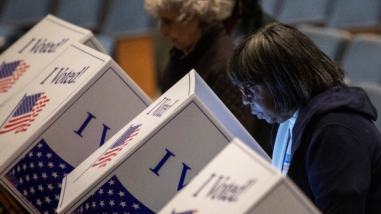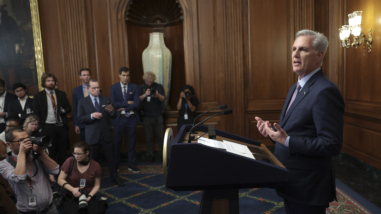The Alliance for Securing Democracy (ASD) was launched in July of 2017 with one of my favorite taglines – “Putin Knocked. We Answered” – as a deliberately bipartisan, transatlantic effort to improve U.S. national security.
The Hewlett Foundation was among the alliance’s first funders, with support from our Madison Initiative that works to strengthen U.S. democracy and our Cyber Initiative. The alliance works to “develop comprehensive strategies for government, private sector, and civil society to defend against, deter, and raise the costs on foreign state actors’ efforts to undermine democracy and democratic institutions, and to publicly document and expose these actors’ ongoing efforts to subvert democracy in the United States, in Europe, and around the world.”
This summer, the Alliance for Securing Democracy released its “Policy Blueprint for Countering Authoritarian Interference in Democracies.” I caught up with co-founders Laura Rosenberger (former foreign policy advisor for Hillary for America) and Jamie Fly (former foreign policy advisor to Senator Marco Rubio) to understand their views on the upcoming U.S. elections, and more.
What worries you most about foreign interference in U.S. elections?
Laura Rosenberger: The right of Americans to choose their leaders in free and fair elections is core to the functioning of our democracy. The health and strength of our democracy also depends on Americans’ ability to engage freely in political speech, to hold vibrant debates free from manipulation, and to obtain reliable information about the issues of the day. Foreign interference in our elections, which is part of broader efforts to undermine our democratic institutions, targets the heart of these essential democratic functions.
We are deeply concerned – and believe all Americans should be – that a foreign state would target an American election either to manipulate the outcome or to cast doubt on the integrity of the entire electoral process. Many Americans have lost faith in our democratic institutions, which are often seen as remote and disconnected from their lives. Authoritarians seek to exploit this opening and to fan the flames of division, pitting Americans against each other and weakening America on the global stage.
What are the most important things the U.S. government and Congress can do to respond?
Jamie Fly: Our leaders need to come together across party lines to demonstrate that defending our democracy against foreign interference is not a partisan issue. Many foreign interference operations seek to amplify political divisions among Americans and further paralyze our government. Partisan responses to this issue therefore only play into our adversaries’ hands. Our leaders have an essential role to play in educating the broader public regarding the threat and not politicizing the interference. Americans need to see a united front from our leaders, just as much as our adversaries need to see that they cannot drive wedges between Democrats and Republicans.
In our bipartisan Policy Blueprint for Countering Authoritarian Interference in Democracies, we recommend specific measures that both Congress and the executive branch can adopt immediately to secure our democracy, including our elections. Exposing interference operations is critical to reducing their effectiveness and building resiliency against them. We also need to address structural challenges in our government to ensure that these threats and our responses do not fall in the seams (for example, by appointing a senior-level counter-foreign interference coordinator at the National Security Council, and establishing a National Hybrid Threat Center), and build effective mechanisms for coordination between the public and private sectors.
Other specific measures include: improving the cybersecurity of electoral infrastructure and ensuring there are paper ballots to corroborate electronic voting records; mandating that online political ads include information about the sources of their funding; and closing off financial loopholes that permit foreign states to move money illicitly into the United States for political purposes.
Who else needs to play a role?
LR: Securing our elections – and defending our democracy more broadly – requires a whole-of-society approach. In particular, tech companies need to do more to reduce the ability of foreign actors to manipulate their platforms by engaging in inauthentic behavior to spread disinformation, amplify divisions between Americans, and influence the American electorate. Tech companies also need to develop better mechanisms to identify threats in new technology before they are exploited – as former Facebook CSO Alex Stamos said, to “think adversarially in every process, product, and engineering decision.”
Media organizations have a responsibility to the American people to report accurately and ethically about politics. This includes exercising caution when reporting on leaked information that was obtained through hacks, as such information has been weaponized by a foreign power for the purpose of manipulating our discourse, and in some cases may be fabricated. When citing social media sources, journalists also need to verify the authenticity of the users – a Columbia Journalism Review study found that all but one of 33 major media organizations in the United States cited fake social media accounts created by Russian government-affiliated operatives as sources in their stories about the 2016 campaign, giving credibility to bogus accounts and amplifying their reach.
Civil society is also critical to securing our democracy against foreign interference. We need to build resilience at home, including by addressing some of the weaknesses in our own society that foreign actors exploit; restore Americans’ faith in democracy, including through renewed emphasis on civics education; and expanded media literacy training.
What, if anything, gives you hope for the future?
JF: Thanks to congressional and other investigations, Americans now know much more about the threat of foreign interference in our elections and what happened in 2016. Having now recognized the problem, tech companies have begun to take action to address foreign manipulation of their platforms. Federal and state governments have improved coordination to share threat information and secure electoral infrastructure. Individual government agencies have stepped up activities to counter foreign interference. And numerous bipartisan bills have been introduced that would address vulnerabilities in our electoral process; unfortunately, those bills have not passed prior to the midterm elections.
Civil society has also stepped up activity on these issues, with numerous organizations devoted to analyzing the threat of foreign interference operations, raising awareness about the threat to policymakers in government and to the American public, and working with the public and private sector on possible solutions.
American democracy has proven resilient in the face of previous challenges, and we are confident that with bipartisan focus, civic engagement, and the private sector stepping up, Americans’ rights to free and fair elections and ability to engage in unmanipulated speech will be protected.
What will you be watching most closely in the mid-term elections?
LR: Russia’s efforts to interfere in our democracy did not stop after November 2016, as it has continued to engage in information operations aimed at sowing discord and polarizing Americans. Much of this activity is not focused on a particular candidate or election, but rather about divisive social issues. The Department of Justice’s charges of a Russian national, released on October 18, for involvement in information operations was the latest evidence that these activities are ongoing, with goals “to sow division and discord in the U.S. political system, including by creating social and political polarization, undermining faith in democratic institutions, and influencing U.S. elections, including the upcoming 2018 midterm election.”
We are also concerned about activity aimed at discrediting the electoral process itself – sowing doubt about its integrity either through cyber activity or information operations. Elections are based on trust, and that’s why it’s essential that government and the private sector take necessary steps to address any vulnerabilities and assure Americans that our elections are secure. Other actors, including China, may be seeking to emulate parts of Russia’s playbook to undermine our democracy, making strong deterrent action against those who attempt to undermine American democracy all the more essential.




